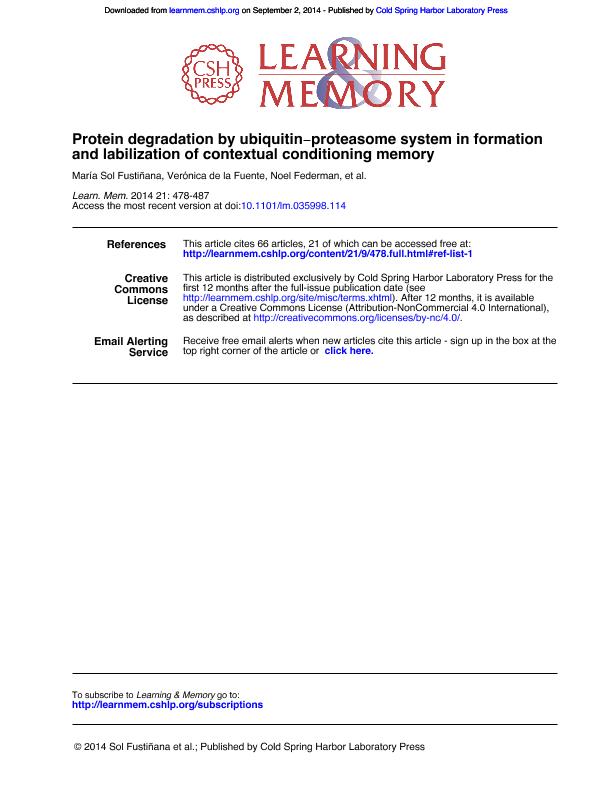Artículo
Protein degradation by ubiquitin-proteasome system in formation and labilization of contextual conditioning memory
Fustiñana, María Sol ; de la Fuente, Verónica
; de la Fuente, Verónica ; Federman, Maria Noel
; Federman, Maria Noel ; Freudenthal, Ramiro A. M.
; Freudenthal, Ramiro A. M. ; Romano, Arturo Gabriel
; Romano, Arturo Gabriel
 ; de la Fuente, Verónica
; de la Fuente, Verónica ; Federman, Maria Noel
; Federman, Maria Noel ; Freudenthal, Ramiro A. M.
; Freudenthal, Ramiro A. M. ; Romano, Arturo Gabriel
; Romano, Arturo Gabriel
Fecha de publicación:
09/2014
Editorial:
Cold Spring Harbor Laboratory Press
Revista:
Learning & Memory (Cold Spring Harbor, N.Y.)
ISSN:
1072-0502
Idioma:
Inglés
Tipo de recurso:
Artículo publicado
Clasificación temática:
Resumen
The ubiquitin-proteasome system (UPS) of protein degradation has been evaluated in different forms of neural plasticity and memory. The role of UPS in such processes is controversial. Several results support the idea that the activation of this system in memory consolidation is necessary to overcome negative constrains for plasticity. In this case, the inhibition of the UPS during consolidation impairs memory. Similar results were reported for memory reconsolidation. However, in other cases, the inhibition of UPS had no effect on memory consolidation and reconsolidation but impedes the amnesic action of protein synthesis inhibition after retrieval. The last finding suggests a specific action of the UPS inhibitor on memory labilization. However, another interpretation is possible in terms of the synthesis/degradation balance of positive and negative elements in neural plasticity, as was found in the case of long-term potentiation. To evaluate these alternative interpretations, other reconsolidation-interfering drugs than translation inhibitors should be tested. Here we analyzed initially the UPS inhibitor effect in contextual conditioning in crabs. We found that UPS inhibition during consolidation impaired long-term memory. In contrast, UPS inhibition did not affect memory reconsolidation after contextual retrieval but, in fact, impeded memory labilization, blocking the action of drugs that does not affect directly the protein synthesis. To extend these finding to vertebrates, we performed similar experiments in contextual fear memory in mice. We found that the UPS inhibitor in hippocampus affected memory consolidation and blocked memory labilization after retrieval. These findings exclude alternative interpretations to the requirement of UPS in memory labilization and give evidence of this mechanism in both vertebrates and invertebrates.
Palabras clave:
PROTEASOME
,
LABILIZATION
,
FEAR-CONDITIONING
,
MEMORY
Archivos asociados
Licencia
Identificadores
Colecciones
Articulos(IFIBYNE)
Articulos de INST.DE FISIOL., BIOL.MOLECULAR Y NEUROCIENCIAS
Articulos de INST.DE FISIOL., BIOL.MOLECULAR Y NEUROCIENCIAS
Citación
Fustiñana, María Sol; de la Fuente, Verónica; Federman, Maria Noel; Freudenthal, Ramiro A. M.; Romano, Arturo Gabriel; Protein degradation by ubiquitin-proteasome system in formation and labilization of contextual conditioning memory; Cold Spring Harbor Laboratory Press; Learning & Memory (Cold Spring Harbor, N.Y.); 21; 9; 9-2014; 478-487
Compartir
Altmétricas



